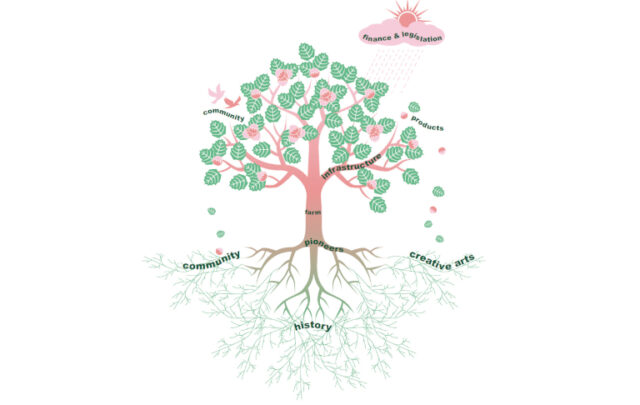
After the interview, Aftab probed a little deeper. “As you know,” he said, “the essence of capitalism lies not in the kind of money being used, but in control over capital in a broader sense. Why then do you not describe your thinking as post-capitalist?”
One reason is simply strategic: the term “capitalism” is so fraught with a century and a half of ideological baggage that it is impossible to use the term without triggering blunt political categorizations, throwing the conversation onto well-worn and deeply rutted paths. For example, it invites comparisons with the failed experiments in state socialism of the 20th century, or suggests that I don’t value individual enterprise and initiative.
There is a second, and deeper, reason why I avoid the term: if we define capitalism as the private ownership of the means of production, and post-capitalism as ending that private ownership, we are still reifying “ownership” or property as an absolute category. But in fact, ownership like money is nothing but a social agreement, a system by which society allocates certain exclusive rights to decide how capital is used. Even in the most resolutely capitalist countries, this right is never absolute: to take a trivial example, zoning ordinances severely limit what we can do with our property in American suburbia.
What is more relevant to me than the fiction of property is the precise nature of the social agreements that define and underlie property. In Soviet state socialism, despite ideology to the contrary, it was actually a small elite group that decided how the means of production were to be deployed (and who reaped most of the benefits). In that sense it wasn’t so different from Western capitalism.
Reading Sacred Economics, one might think, “This is still capitalism. It still allows private ownership of land, factories, intellectual property, and other means of production.” But if we don’t see ownership is a reified category, an absolute predicate, then the matter is not so simple. Because what is this “ownership”? What is the social agreement that the concept embodies? It is rather different than what we have today.
Echoing Roman law, to own something today implies the right to ”use, enjoy, and abuse” it. In other words, all the benefits derived from it are yours, and you are under no obligation to use it in a way that benefits society or the planet. (As mentioned, this has seldom entirely been the case in practice.) What would ownership mean if we significantly altered this Roman law conception? That is what Sacred Economics proposes. First, it circumscribes the private right to “use and abuse” property by penalizing socially and environmentally harmful activities like polluting. Secondly, inspired by Henry George, it separates as much as possible the “enjoyment” (i.e. the fruits) of ownership from the fruits of the labor and creativity added to the thing owned. This means eliminating “economic rents” – the proceeds one obtains through the mere ownership of property, as opposed to the improvement of the property or the wise use of the property. Thirdly, it limits the extent to which one may enclose the cultural and intellectual commons, in part by curtailing copyright and patent terms. Finally, it asserts a public interest onto financial capital by subjecting money to a demurrage fee, a negative interest rate, that discourages hoarding and encourages zero-interest lending, in essence making money less of a thing you can keep, hold, and own. Hold onto it too long, and eventually it will no longer be “yours.”
These might seem like technical reforms that leave the fact of ownership of the means of production unchanged, but actually they change what “ownership” means. When we understand that property is a fluid concept, a broad label we give to a complicated set of social agreements, then it becomes hard to say what is capitalism and what is not.
At bottom, the blurriness of the concept of ownership implicates the blurriness of the concept of the owner. Who, or what, owns property? The 17th-century thinkers that developed the philosophical foundations of property law (and law in general), Hobbes, Locke, Pufendorf, Hutcheson, etc., despite their differences, all pretty much took for granted a world of separate indivduals giving consent, entering into contracts, and making free-willed moral choices. It is from this assumption that libertarian ideas about the sanctity of property and the sanctity of contract are born, along with the irreconcilable difficulties that arise in integrating these with the good of the body politic. Private property (its presence or absence as an absolute category) goes hand in hand with the separate self. A system grounded in the understanding of our inter-existence, in the fluid and fractal co-construction of self and society, no longer takes ownership as a well-defined category. The terms capitalist, socialist, post-capitalist, and so forth, because they draw on ownership as an elemental concept, are therefore a little bit obsolete.























